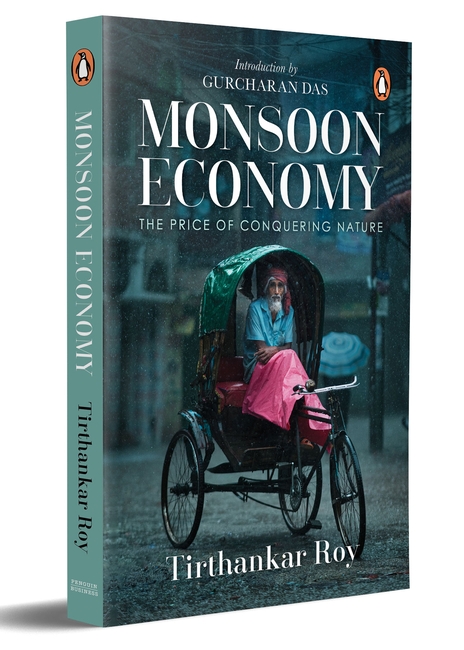
© 2020 Penguin India

In the monsoon regions of South Asia, the rainy season sustains life but brings with it the threat of floods, followed by a long stretch when little gainful work is possible and the threat of famine looms too. Beginning in the late nineteenth century, a series of interventions by the Indian government and other actors mitigated these conditions, thus enabling agricultural growth, encouraging urbanization and bringing about a permanent decrease in death rates. But these actions—largely efforts to ensure wider access to water—came at a cost to environmental sustainability. In Monsoon Economy, Tirthankar Roy explores the interaction between the environment and the economy in the emergence of modern India.
Roy argues that the tropical monsoon climate makes economic and population growth contingent on water security. But in a water-scarce world, the means used to increase water security not only created environmental stresses but also made political conflict more likely. Highlighting the importance of water as a public good, the author critically analyses issues such as water quality in cities, the shift from impounding river water in dams and reservoirs to exploring groundwater, and the seasonality of a monsoon economy. He also draws economic lessons from India for a world facing environmental degradation.
Imprint: Penguin Business
Published: Oct/2023
ISBN: 9780143463948
Length : 224 Pages
MRP : ₹399.00
Imprint: Penguin Audio
Published:
ISBN:
Imprint: Penguin Business
Published: Oct/2023
ISBN:
Length : 224 Pages
MRP : ₹399.00
In the monsoon regions of South Asia, the rainy season sustains life but brings with it the threat of floods, followed by a long stretch when little gainful work is possible and the threat of famine looms too. Beginning in the late nineteenth century, a series of interventions by the Indian government and other actors mitigated these conditions, thus enabling agricultural growth, encouraging urbanization and bringing about a permanent decrease in death rates. But these actions—largely efforts to ensure wider access to water—came at a cost to environmental sustainability. In Monsoon Economy, Tirthankar Roy explores the interaction between the environment and the economy in the emergence of modern India.
Roy argues that the tropical monsoon climate makes economic and population growth contingent on water security. But in a water-scarce world, the means used to increase water security not only created environmental stresses but also made political conflict more likely. Highlighting the importance of water as a public good, the author critically analyses issues such as water quality in cities, the shift from impounding river water in dams and reservoirs to exploring groundwater, and the seasonality of a monsoon economy. He also draws economic lessons from India for a world facing environmental degradation.
Tirthankar Roy is professor of economic history at the London School of Economics and Political Science. He is the author of The Economic History of India, 1857–2010, The East India Company: The World’s Most Powerful Corporation, The Crafts and Capitalism: Handloom Weaving Industry in Colonial India and co-author of The Economic History of Colonialism, and Law and the Economy in a Young Democracy.